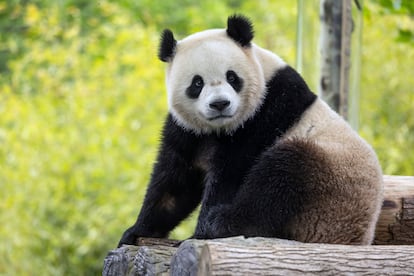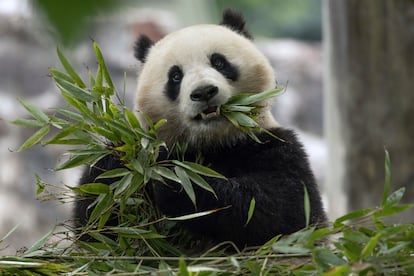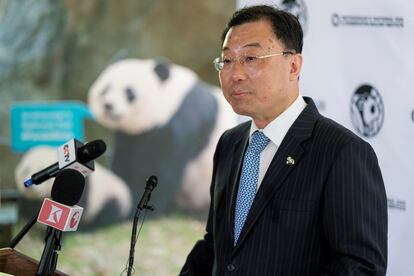Panda diplomacy returns as China and US announce deal with Washington Zoo
The couple, Bao Li and Qing Bao, both two years old, will arrive in the US capital at the end of this year after the departure in November 2023 of Mei Xiang, Tian Tian and Xiao Qi Ji


Sino-U.S. relations, which have been increasingly tense of late, have experienced a brief respite: the Washington Zoo has announced that a pair of pandas will arrive from China later this year to occupy the enclosure built especially for these animals, which had remained empty since Beijing repatriated the last pair, Mei Xiang and Tian Tian, and their son Xiao Qi Ji, in November last year.
“It’s official, the pandas are coming back to Washington DC!” announced First Lady Jill Biden, hugging a teddy bear, in a video to announce the official agreement between the institution and Chinese authorities.
The two new pandas, Bao Li (“Energetic Treasure”) and Qing Bao (“Green Treasure”), are both two years old and are now in the reserves designated for these animals in the mountains of Chengdu, their natural habitat. Bao Li, the male, has a special connection to Washington: he is the grandson of Mei Xiang and Tian Tian, and his mother, Bao Bao, was born in the U.S. capital.

“This historic moment is proof positive our collaboration with Chinese colleagues has made an irrefutable impact. Through this partnership, we have grown the panda population, advanced our shared understanding of how to care for this beloved bear and learned what’s needed to protect wild pandas and preserve native habitat,” said Washington Zoo Director Brandie Smith.
Once the animals arrive in Washington, transported by cargo plane, they will spend 30 days in quarantine in their enclosure at the zoo. After that time, they will spend several weeks getting used to their new home before being presented to the public, something for which the institution has not yet announced a date.
As is usual in these types of agreements between Western zoos and Chinese authorities, the pair of pandas will be on loan to the Washington institution for a decade, until 2034. During this period the Smithsonian Institution, of which the zoo is part, will pay $1 million per year to China for its investment in research programs on these bears.
One of the hopes is that the pair will procreate, either naturally or through artificial insemination. In that case, their offspring will remain at the Washington Zoo until they are four years old. But the agreements provide that the cubs will be considered Chinese property, at which point they will have to be repatriated to their country of origin. Mei Xiang and Tian Tian had four cubs over two decades: in addition to Bao Bao and Xiao Qi Ji, Tai Shan was born in 2005 and Bei Bei in 2015. All of them were returned to China at the age of four.

The departure of Mei Xiang and Tian Tian was part of a widespread repatriation of the pairs of pandas that China had given to U.S. zoos, in what was interpreted as a symbol of the deterioration of relations between the two governments. Beijing uses the endangered black-and-white animals as a diplomatic tool and often gives them to countries with which it has good relations, or where it is interested in strengthening them.
At a press conference at the zoo Wednesday to confirm the announcement, China’s ambassador to Washington, Xie Feng, urged Americans to “take care of China-U.S. relations like they take care of pandas.” “For the wellbeing of both peoples and the future of the world, China and the United States should choose to be partners, not rivals,” said Xie. “Panda-huggers (a term used in diplomatic circles to describe Beijing sympathizers) should not be stigmatized. “If there should be any protectionism, then let’s protect biodiversity.”
Sign up for our weekly newsletter to get more English-language news coverage from EL PAÍS USA Edition
Tu suscripción se está usando en otro dispositivo
¿Quieres añadir otro usuario a tu suscripción?
Si continúas leyendo en este dispositivo, no se podrá leer en el otro.
FlechaTu suscripción se está usando en otro dispositivo y solo puedes acceder a EL PAÍS desde un dispositivo a la vez.
Si quieres compartir tu cuenta, cambia tu suscripción a la modalidad Premium, así podrás añadir otro usuario. Cada uno accederá con su propia cuenta de email, lo que os permitirá personalizar vuestra experiencia en EL PAÍS.
¿Tienes una suscripción de empresa? Accede aquí para contratar más cuentas.
En el caso de no saber quién está usando tu cuenta, te recomendamos cambiar tu contraseña aquí.
Si decides continuar compartiendo tu cuenta, este mensaje se mostrará en tu dispositivo y en el de la otra persona que está usando tu cuenta de forma indefinida, afectando a tu experiencia de lectura. Puedes consultar aquí los términos y condiciones de la suscripción digital.








































